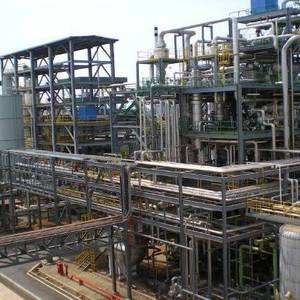Benefuel, Felda JV to retrofit 75 MMgy Malaysian biodiesel plant

Photo: Mission NewEnergy
August 29, 2014
BY Ron Kotrba
New ownership and biodiesel process technology are planned for the 75 MMgy Mission NewEnergy plant in Kuantan Port, Malaysia. Benefuel International Holdings S.A.R.L., a subsidiary of Benefuel Inc., and a subsidiary of Felda Global Ventures Sdn. Bhd., the world’s largest crude palm oil producer, have formed a joint venture that has agreed to acquire the facility and retrofit the plant with Benefuel’s Ensel solid catalyst technology, which combines both esterification of free fatty acids (FFA) and transesterification of triglycerides into a single process. The joint venture also includes M2 Capital Sdn. Bhd., a subsidiary of Australia’s Mission NewEnergy, the current owner of the plant. The transaction is expected to close in the fourth quarter of 2014, and the plant is expected to be operational in late 2015.
Last year Felda Global Ventures Downstream Sdn. Bhd. acquired another biodiesel asset scaled at 30 MMgy from Mission NewEnergy on the same site. According to Rob Tripp, CEO of Benefuel, the technology in the 30 MMgy facility was provided by Crown Iron Works, based on conventional liquid catalysis. The biodiesel process technology in the 75 MMgy plant is different though. It used Axens solid catalysis, the same technology that was originally deployed in the Beatrice, Neb., biodiesel plant that Benefuel’s joint venture with Flint Hills Resources, Duonix LLC, is now retrofitting with its own Ensel solid catalyst technology.
“We are excited to team up with FGV and Mission NewEnergy to acquire and operate the Kuantan Port plant,” Tripp said. “This facility will use lower-cost, high-FFA feedstock, a byproduct of the crude palm oil milling and refining process. The Kuantan Port plant is a great opportunity.”
Advertisement
The facility is situated on a deep water port and logistically advantaged to serve both the Malaysian domestic market and International markets like Europe and the U.S. It is close to FGV’s plantations and palm oil refineries, ensuring a consistent and high quality feedstock supply, Tripp said.
“As a country, Malaysia has taken a leadership position in biodiesel initiatives,” Tripp said, adding that a 5 percent national blend mandate is already in place in most of the country and is to be implemented nationwide this December, with discussions on moving to a 7 percent blend already underway. “And we look forward to working with FGV to satisfy the region’s growing demand for biodiesel,” he said. “With the establishment of strong equity and project partners like Koch Industries, Suncor Energy, Itochu and FGV, we are rapidly developing a strong project pipeline of opportunities, both on a retrofit and greenfield basis. Given our capital and operating cost advantages, and the growing global mandates for biodiesel blends, we expect to be busy for a long time. In the interim, we look forward to closing this transaction and for the joint venture becoming the low-cost producer of biodiesel in Malaysia.”
Advertisement
Related Stories
Paving the way for a more climate conscious future, hydronic comfort heating solutions leader Weil-McLain has announced that its Ultra Oil, WGO, WTGO and SGO residential oil boilers are now certified for use with biofuel blends up to 100% (B100).
EFT licensee Highbury Energy Inc. and WBCEC are advancing a CAD$210M Indigenous-led biomass-to-fuels project in Fort Frances, Ontario. The facility will use woody biomass to produce SAF and renewable diesel.
The U.S. EPA on Sept. 12 released a proposed rule to end the Greenhouse Gas Reporting Program. If finalized, the proposal would remove reporting obligations for most large facilities, all fuel and industrial gas suppliers, and CO2 injection sites.
The Coalition for Renewable Natural Gas and American Fuel & Petrochemical Manufacturers in September filed separate lawsuits challenging the U.S. EPA’s final rule to partially waive 2024 cellulosic blending obligations under the RFS.
Provectus Biofuels Inc. on Sept. 11 announced it has signed a non-binding letter of intent with a regional Alberta airport that sets out indicative terms under which both parties intend to negotiate a definitive long-term offtake agreement for SAF.
Upcoming Events










